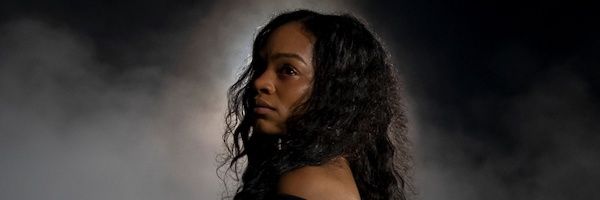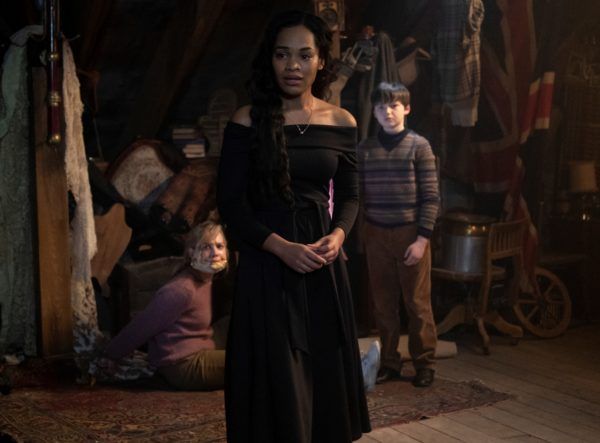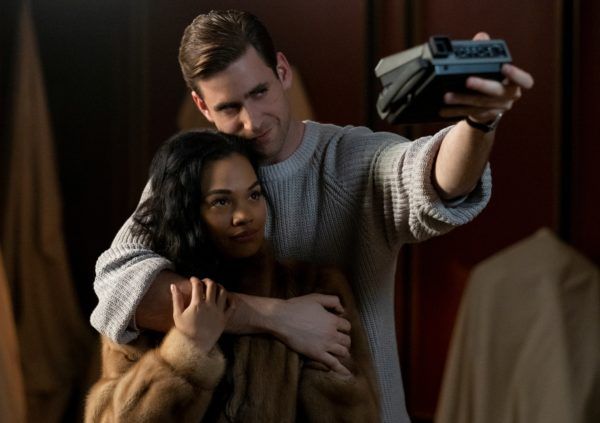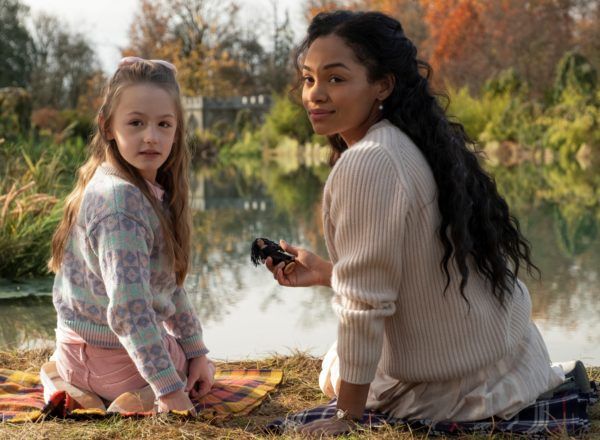[Editor's note: The following contains spoilers for The Haunting of Bly Manor.]
From filmmaker Mike Flanagan and drawing from the iconic supernatural stories of Henry James, the Netflix original The Haunting of Bly Manor, which is also the second installment in The Haunting anthology series, finds a young American nanny in 1980s England. When Dani Clayton (Victoria Pedretti) arrives at Bly Manor to care for the orphaned Flora (Amelie Bea Smith) and Miles (Benjamin Evan Ainsworth), she learns that all is not as it seems, as love, loss, and grief permeate the residence.
Collider recently got the opportunity to chat 1-on-1 with actress Tahirah Sharif, who plays Flora and Miles' previous nanny Miss Jessel, about her reaction to finding out she’d gotten the role, how collaborative the creative team was, her excitement over joining the Haunting universe, exploring the love story between Rebecca Jessel and Peter Quint (Oliver Jackson-Cohen), how strange it is to have hidden ghosts lurking around during the shoot, and the moments that most scared her.
COLLIDER: I was a fan of The Haunting of Hill House, like many people were, and that made me nervous about The Haunting of Bly Manor, even though they’re such different stories. What was it like for you when this project came your way? What kind of audition journey did you go on for this?
TAHIRAH SHARIF: I self-taped for this role. It was such an interesting time. It was about August, last year, and the role came up and I knew it was The Haunting of Bly Manor. Like yourself and like so many other people, I was a real fan of the first series, so I was really excited. The only thing was that we just weren’t given any context, whatsoever. We weren’t given any other scripts or anything. It was literally just two different scenes. Both of those scenes were actually in the final project. I just had to do my take on Rebecca Jessel because I wasn’t given a load of information and I wasn’t exactly sure who she was even talking to, or anything. It was really interesting. So, we sent off that tape and I remember my team was like, “Oh, these are really good tapes.” As an actor, we do audition tapes all the time and sometimes you never hear back, or you don’t get the job. This particular time, it was seven days later that my manager and agent called me up. A few days before, they said, “They really like your tapes,” and I told them, “Don’t tell me that.” When they tell you that casting likes your tapes, you get your hopes up and then get bitter when you don’t happen to book the role. So, I didn’t wanna know. And then, they called up and were like, “You booked it.” I just couldn’t believe it. For weeks after, I kept on calling my agent and checking that I definitely got the role.
You said that your audition scenes made it into the final show, but were there things, once you started reading the scripts, that changed along the way?
SHARIF: With any TV or film production, things are so changeable. Thankfully, Mike Flanagan and the rest of the writers and directors were really open to changes if something didn’t feel right for your character or it was something that they wouldn’t authentically say. As an actor, you do a lot of work on your character and their backstory, so if something that was already written didn’t quite marry to the work that you’d done, they were really open to making changes and it being collaborative, which was amazing. Dialogue definitely changed and intentions changed. On a long TV series, where you’re developing your character over the course of five months, after awhile there’s no one who knows your character better than you.
You’re new to the Haunting world. How daunting and scary was that? What was your first day on set like?
SHARIF: I remember it exactly. I wasn’t daunted. I was just super excited. I kept on saying, “Oh, I can’t wait! I can’t wait to just get on set and get going and get started and sink my teeth into this character.” I couldn’t wait, honestly. And then, naturally, my first day on set, I was really nervous. Oliver Jackson-Cohen, who I worked most closely with, was just lovely, really welcoming, and really supportive, so that helped a lot. Everyone – the crew, Mike, [executive producer] Trevor [Macy] and just absolutely everyone – was really, really, really nice, which made it a lot easier to slot into. They were all very much like, “Just make this character your own. It’s not like you’re coming into a second series of Hill House. This is a whole brand new thing, with a brand new story and characters.” I actually think that’s what made it less daunting. It was new for everyone, even Victoria [Pedretti], Oli, Henry [Thomas], and all of the returning cast of Hill House. It was all new for them, as well. Yes, they had worked with each other before, but this was a new world and new characters for them.
When you are working so closely with somebody in a story, as you do with Oliver Jackson-Cohen, that’s such a complicated relationship that your characters have in the series. What was it like to really share that experience with him and get thrown into this dynamic with him, and then have to find it while you’re working together?
SHARIF: That part is always daunting. Whenever you start a new project and you’re having to play someone’s love interest, or someone’s mom or sister, or whatever that close relationship is, but you’ve never met before in real life and you have to make those moments authentic. What was really nice about Oli was that he was really supportive and really collaborative. We spent time just working on our characters and sharing with each other the work that we would do separately. He would tell me his backstory for Quint and I would tell him my backstory for Jessel, and we would figure out how these two worlds would collide. We would discuss what made Quint and Jessel fall so hard for each other because that was really important and something that we wanted to really get across. We didn’t want it to come across as this shallow romance. We wanted it to come across that, as toxic and unhealthy as it may have been, these two characters genuinely loved each other and the reasons for that, just to make it as grounded and real as possible.
When you are exploring a relationship like that, that is sweet and beautiful but also obsessive and possessive, how did you feel about the relationship between them? What was it like to explore that?
SHARIF: I’ll be honest, at first I was really worried that Jessel was gonna come across as this weak character who falls for this bad boy villainous character that was Quint. That’s not what I wanted and that’s not what Oli wanted either. So, we really talked a lot about what these characters wanted and what they were searching for in a partner or in life, that they obviously found within each other. And then, I started to think about the fact that Rebecca is an intelligent, ambitious, and determined woman. She’s not stupid. The whole point was that you can be all of these things but you can still find yourself intertwined with somebody who is controlling and is possessive and still not be able to see that clearly because you’re so caught up in it. We tried, not in a very heavy-handed way, to deal with the fact that there is a very fine line sometimes between love and possession. With Jessel and Quint, that was very apparent between them. It happens all the time in real life. I’m sure a lot of people can relate to, at one point in their life, being in a relationship where, when they were in it, they just couldn’t see how unhealthy it was. It’s only when you’re out of it that you can go, “Wow, really?" With Rebecca, she unfortunately got to that point too late by the time she really saw Quint for what he was. And that’s not necessarily someone evil. It was just someone who was really damaged and maybe didn’t really know how to love because he didn’t really love himself but it was too late. She was dead. In another reality without ghosts, they probably would have enjoyed their romance and then she would have gone, “No, this isn’t right for me. I’m gonna carry on with my career.”
Since she ends up where she does, essentially because of him, did you personally see him as the bad guy in this story and would she see him as the bad guy in this story?
SHARIF: When I read the script, he was this evil character who had done these awful things. But then, when me and Oli started working together and were unpacking why he was acting the way he was, it got really steeped in reality. When you come across someone who does “bad” things, you can start to unpack why and go back to their child. We’re all products of our environment. With Quint, I did think, at first, that he was such a horrible person, but then you start to understand why. He does have a side of him that wants to love and be loved. He doesn’t want to feel abandoned, which is why he holds onto her so tightly and just doesn’t want to let her go. Actually, I think Rebecca probably doesn’t hate him. She probably feels sorry for him, even though he does this awful thing to her, essentially because she is someone that’s a good person. She probably thinks he’s cowardly and spineless but probably just pities him, more than hates him.
SHARIF: Yeah, she’s awesome. Amelie was just absolutely wonderful as was Ben [Evan Ainsworth]. They’re terrific actors and little human beings who are such a joy to work with and to have on set all the time. Luckily, I got on with Amelie’s mom really well, so off set, we would go through the script and work out little things, but nothing major. I didn’t want her to be doing a carbon copy of me but there were tiny little things. As Rebecca, I was always playing with my hair. I would tuck it behind my ear because Rebecca is quite neat and well put together. I told Amelie to just keep that in mind when she’s possessed by me. I think she did a brilliant job.
You’ve previously talked about how there are hidden ghosts to look out for in this. What’s it like to do a scene where there’s a ghost somewhere in the background? Does it just mean that some man or woman is lurking somewhere, all the time?
SHARIF: Yeah. It was such an odd working environment sometimes. You’d be preparing for your scene and you’d be looking around and be like, “Oh, my gosh!,” because someone was lurking in the shadows somewhere, looking really creepy. The plague doctor always got me. That would scare me because he would always be in his full mask and you would never see him. He’d just be there. That was really funny. And the little doll ghost, the child, was so creepy. It was so funny. We did a scene in episode 3, where Rebecca and Quint get it on the first time, and he comes to her door. In most scenes, there were all different ghosts lurking around, and whenever we would do scenes where we were in bed together or we had to kiss, it would always be a bit strange that there was a ghost in the corner, staring at us. It would feel a bit seedy but we’d have a good laugh about that. It was so inappropriate. We genuinely had the ghosts lurking in corners at all times. It was so bizarre but it was genuinely a lot of fun as well.
There are definitely scary moments and creepy feelings throughout the whole season. Things are scariest for me when the horror of things is most deeply related to the characters. What are the scariest moments for you?
SHARIF: Whenever we would shoot on location, outside at the lake at nighttime, even though you know it’s make-believe and it’s a set and everything is fake, whenever you would look at that lake and they would be pumping the smoke atmosphere over it, I would genuinely think, “This is really creepy.” That scene where I walk into the lake, I do remember getting chills. Even being on set, it looked incredible. Visually, it looks fantastic. I watched the Lady of the Lake coming out of the water and going into it, and one of the creepiest moments for me was the Lady walking into the lake with the child who ends up being the doll face ghost because it’s just so heartbreaking. You know why she’s doing it, but then there’s this child that’s going to die. It’s awful.
Obviously, all is not what it seems at Bly Manor, and this series has a constant mixture of creepy and emotional. What were the challenges in finding that tone and maintaining it on a day to day basis? Does it ever get physically exhausting to maintain those levels of emotion?
SHARIF: I’d never done this genre before and there’s this very fine line that you tread between being genuinely scared or horrified by something that’s meant to scare you and doing too much. You have to find that line and you have to make things believable. You may not have ever seen a ghost. I’ve never seen my hand go through someone else’s. It’s about trying to find an authentic way to react to something like that because you can’t draw from past experience or real life. And then, the emotional side, because it’s not just the supernatural element that is horrifying and it’s the relationships between the living, there were days that I was physically exhausted after having to cry or be devastated by something. You go into it going, “I’ve got this. I’m an actor. This is my job. It’s my character.”
But when you have to do something like that, again and again for eight hours, you get home and you are physically and sometimes mentally just spent. People expect you, as an actor, to just be okay and to flip between being laughing and joking and being fine into devastating, finding out you’re dead, and then going back to joking again, but sometimes you really can’t. To perform that realistically, you have to almost trick your body into that high state of emotion and it’s not always so easy to come out of it. It does take a while. I really found that on doing Bly, but I also learned an incredible amount. I learned so much about my own abilities to be able to go there emotionally. I always told myself that I find it really difficult but I found that my process on Bly Manor is really gonna help me with a lot moving forward in my next roles. So, as hard and challenging as a lot of those scenes were, I’m so glad for them because I learned an incredible amount.
The Haunting of Bly Manor is available to stream on Netflix.
Christina Radish is a Senior Reporter of Film, TV, and Theme Parks for Collider. You can follow her on Twitter @ChristinaRadish.




